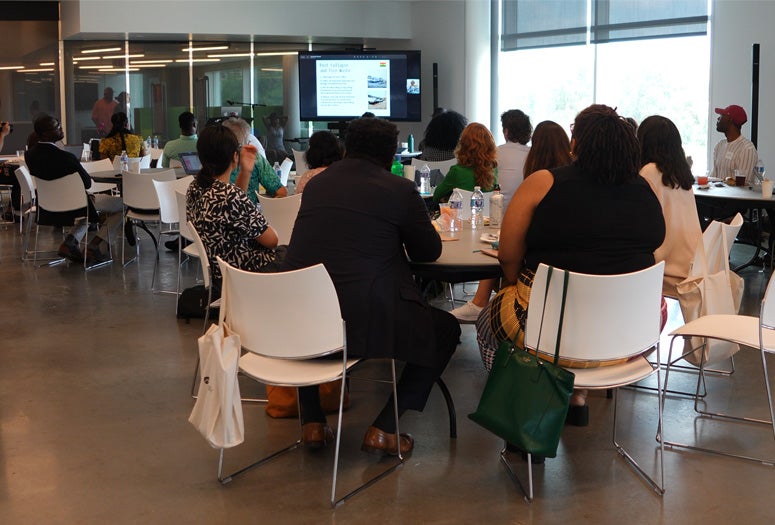Rice University hosted the Energy, Waste and the Environment in West Africa conference Sept. 12-13, an event that convened scholars, policymakers and artists to address pressing environmental issues in West Africa. Organized by Rice assistant history professor Nana Osei-Opare and associate anthropology professor Gökçe Günel, this interdisciplinary conference aimed to spark critical conversations about how societies in the region are managing their natural resources and dealing with the consequences of energy production and waste.
“The conference brings together historians, anthropologists, geographers, policymakers, artists and filmmakers,” Günel said. “We’ve cast a very broad net to ensure diverse perspectives are represented.”
With representatives from West Africa and all over North America, the conference covered a wide array of topics with thematic panels that explored the intersection of energy, waste and environmental challenges. This marked the first time such a comprehensive event on these themes had been hosted at Rice with discussions touching on historical and contemporary responses to environmental crises in the region.
“Our goal was to bring African scholars to Rice to think critically about energy, waste and the environment,” Osei-Opare said, emphasizing the importance of engaging a global audience. “It’s been incredible to see the diverse ways people from Africa, North America and beyond are grappling with these issues across disciplines.”
The event also highlighted two of Rice University’s academic strengths: environmental studies and African and African American studies. The discussions around energy, waste and the environment resonated with both faculty and students, furthering interest in the global implications of these topics.
“In each panel, the people are also citing and talking about other panelists' work that they're drawing from,” Osei-Opare said.
One of the highlights of the conference was the keynote address delivered by Omolade Adunbi, a political and environmental anthropologist from the University of Michigan. Adunbi’s lecture, titled “Ubiquitous Infrastructures: Oloibiri, Climate Politics, and Energy Futures in Nigeria,” examined the legacy of oil infrastructure in Nigeria, particularly focusing on the afterlife of oil facilities long after extraction has ceased.
“What I did with my keynote address was to provoke the audience to think about the afterlife of oil infrastructure,” Adunbi said. “When we discuss energy futures and climate change, we often fail to consider what becomes of the infrastructures built to extract and transport fossil fuels locally and globally. This should be an essential question in the conversation about the future of our climate.”
Using Oloibiri, Nigeria—the site where oil was first extracted and transported to the international market in the country—as a case study, Adunbi illuminated how communities continue to be affected by these infrastructures even after the oil is gone. His talk challenged participants to think critically about the long-term impacts of energy extraction on both the environment and the people living in regions where oil is extracted.
“At the keynote address, what was fascinating was seeing African graduate students and undergrads at Rice engaging in tough, serious, robust questions with the speaker about his talk and about where we can go, the problems and policy questions,” Osei-Opare said.
The panels throughout the two-day conference covered various themes, from waste management practices in Ghana and Senegal to the role of energy transitions in shaping West African economies. According to Tengi George-Ikoli, senior officer at the Natural Resource Governance Institute, the event provided a rare opportunity for attendees to exchange ideas and learn from one another.
“It’s always good to find new ideas and new ways of approaching problems,” George-Ikoli said. “The interdisciplinary nature of this conference allows us to rethink how we address energy and waste management issues in West Africa.”
One particularly insightful discussion involved the role of pre-colonial practices in shaping modern energy transitions with Senegal’s peanut oil industry cited as an example of how local resources can be leveraged to replace coal. Attendees expressed excitement about the potential for further collaboration, both within West Africa and with international institutions.
Several participants, including Doris Edem Agbevivi, a project coordinator for the Drive Electric Initiative in Ghana, spoke about the importance of sustainability and circular economies.
“Waste has brought me to a space of asking, ‘Can we commoditize waste? What would be the economic value of waste?’” Agbevivi said. “If we see value in something, it makes it easier for us to incorporate it into our lives and systems. That’s the way we can improve both the environment and the economy.”
Agbevivi’s insights into the future of electric vehicle batteries and their second-life uses underscored the importance of innovation in addressing both energy production and waste disposal in West Africa.
Osei-Opare expressed optimism about the future of these discussions, noting that the conference has only just begun to scratch the surface of what can be accomplished.
“We hope that in five or ten years, we can revisit these conversations and see the progress that’s been made,” he said. “Rice University has laid the foundation for these debates and we are excited to see where they lead.”
Both Günel and Osei-Opare believe the success of the event will inspire further research and partnerships between Rice University and institutions across Africa and the world. In particular, there are hopes that the ideas discussed at the conference could be developed into a special issue of a journal, allowing the discussions to reach an even broader audience.
“We’re hoping to start a conversation rather than conclude it,” Günel said. “I’m hopeful this will lead to more events on these issues at Rice and beyond.”
The conference received support from the Moody Center for the Arts, the Creative Venture Funds, the Center for Environmental Studies, the Department of History, the Department of Anthropology and the Center for African and African American Studies.

